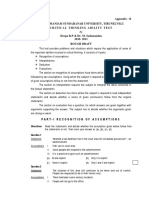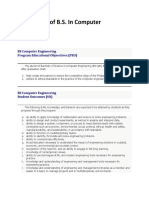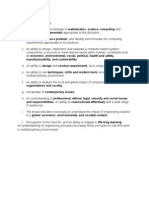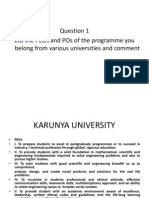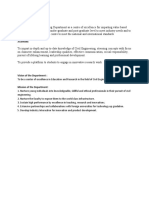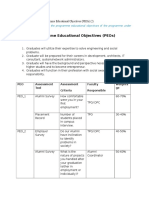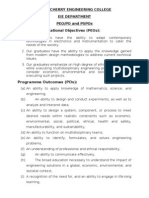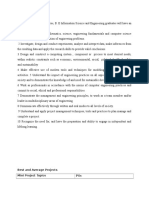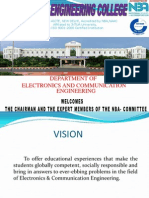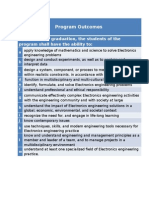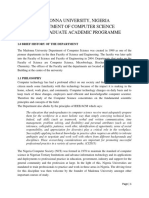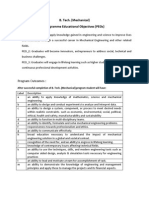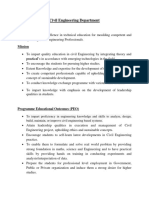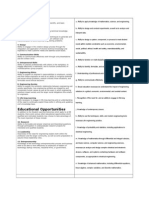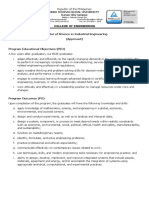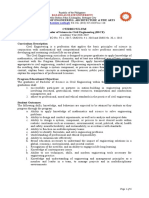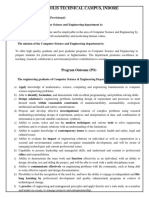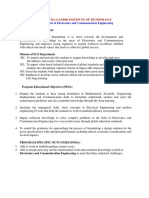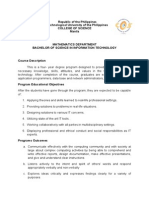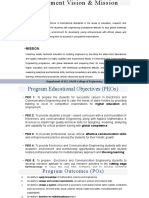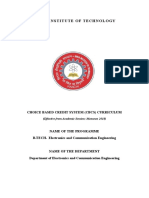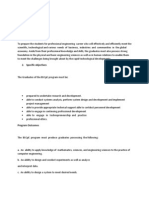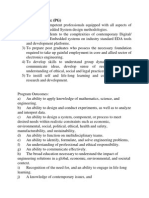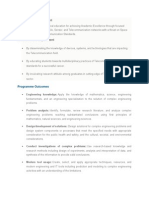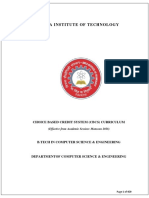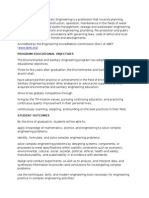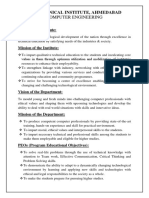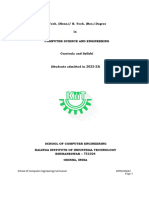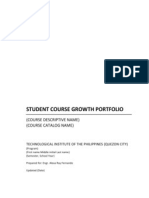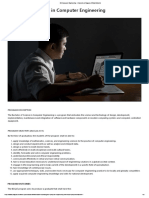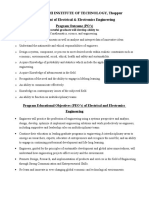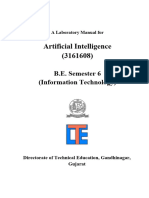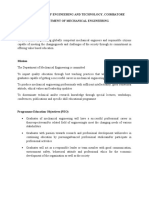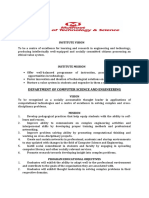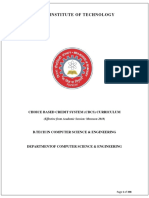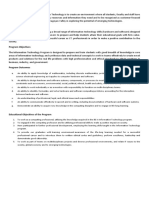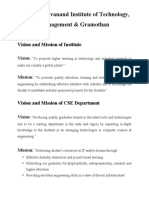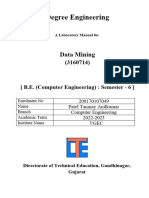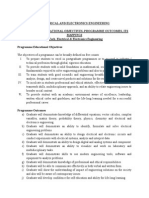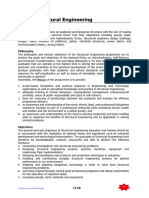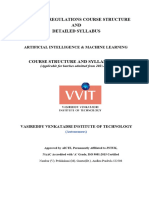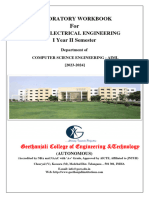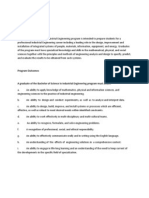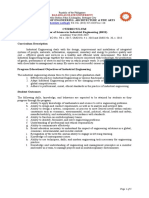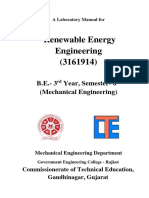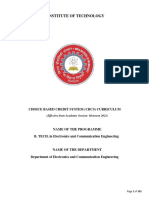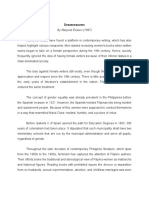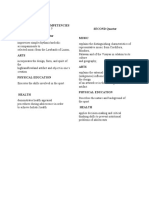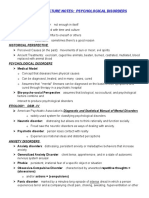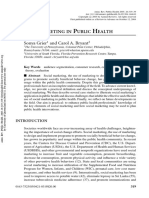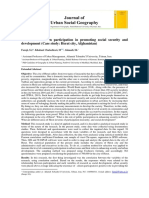Vijay
Vijay
Uploaded by
Prashanth GuntanurOriginal Description:
Copyright
Available Formats
Share this document
Did you find this document useful?
Is this content inappropriate?
Report this DocumentCopyright:
Available Formats
Vijay
Vijay
Uploaded by
Prashanth GuntanurCopyright:
Available Formats
The Department of Electrical and Computer Engineering at Youngstown State is committed to offering its students a
high standard of engineering education. In fulfillment of its mission, as well as the missions of the College of Science,
Technology, Engineering, and Mathematics and the University, the following Program Educational Objectives are
established. Within a few years of graduation, our graduates should be able to:
Apply the latest technology, using engineering hardware and software, and scientific and
mathematical knowledge to solve technical problems individually or in teams.
Function professionally, socially, and ethically in the practice of electrical engineering or in post-
graduate education.
Understand global issues and the impact of engineering and technology on society and the
environment.
Engage in life-long learning to broaden themselves and their profession.
Communicate effectively both individually and in teams.
Student Outcomes
To achieve the Program Educational Objectives after graduation, our students must attain the following Student
Outcomes by the time of their graduation:
an ability to apply knowledge of mathematics, science, and engineering;
an ability to design and conduct experiments, as well as to analyze and interpret data;
an ability to design a system, component, or process to meet desired needs within realistic
constraints such as economic, environmental, social, political, ethical, health and safety, manufactur-
ability, and sustainability;
an ability to function on multi-disciplinary teams;
an ability to identify, formulate, and solve engineering problems;
an understanding of professional and ethical responsibility;
an ability to communicate effectively;
the broad education necessary to understand the impact of engineering solutions in a global,
economic, environmental, and societal context;
a recognition of the need for, and an ability to engage in life-long learning;
a knowledge of contemporary issues; and
an ability to use the techniques, skills, and modern engineering tools necessary for engineering
practice.
Program Educational Objectives
Our students following graduation will be able
a. to enter California's high technology workforce, and make significant contributions to Computer Engineering
through the research, design and development of a wide range of embedded systems and system-on-chip
applications.
b. to help further the state's economic growth by developing innovative ideas, and translating them into commercial
products that benefit society.
c. to function effectively as a team member and/or leader in multidisciplinary and multicultural environments.
d. to recognize the societal and global context of their work and to understand professional and ethical
responsibilities.
e. to pursue lifelong learning through such activities as graduate school, distance education, professional training
and membership in professional societies and to be able to adapt to new engineering tools
Student Learning Outcomes:
The Computer Engineering Curriculum is designed so that each student will have demonstrated the following
competencies upon graduating with a Bachelor of Science in Computer Engineering:
a. Ability to apply Mathematics, Science and Engineering.
b. Ability to design and conduct experiments; as well as to analyze and interpret data
c. Ability to design a system, component or process to meet desired needs within realistic constraints such as
economic, environmental, social, political, ethical, health and safety, manufacturability and sustainability
d. Ability to function in multidisciplinary teams
e. Ability to identify, formulate and solve engineering problems
f. Understanding of professional and ethical responsibility
g. Ability to communicate effectively
h. Understanding the impact of engineering solutions in a global, economic, environmental and societal context
i. Recognizing the need and having the ability to engage in lifelong learning
j. Knowledge of contemporary issues
k. Ability to use techniques, skills and modern engineering tools necessary for engineering practice
You might also like
- 10 Observations From Banging 100 Girls in One YearDocument13 pages10 Observations From Banging 100 Girls in One Yearrabee200950% (2)
- Jetti Marketing PLanDocument41 pagesJetti Marketing PLanjudith matienzo100% (2)
- ReasoningDocument65 pagesReasoningArnab MullickNo ratings yet
- PEO and SO of B.S. in Computer EngineeringDocument2 pagesPEO and SO of B.S. in Computer EngineeringKristineBinadayEstiloNo ratings yet
- Program Outcomes: Engineering Fundamentals Appropriate To The DisciplineDocument2 pagesProgram Outcomes: Engineering Fundamentals Appropriate To The DisciplinejagabeeeeNo ratings yet
- List The Peos and Pos of The Programme You Belong From Various Universities and CommentDocument7 pagesList The Peos and Pos of The Programme You Belong From Various Universities and CommentUpendra RoyNo ratings yet
- Program ObjectivesDocument5 pagesProgram ObjectivesAlvinNo ratings yet
- PEO PO and PSC 17-5-13Document5 pagesPEO PO and PSC 17-5-13DrPrakash G ChithappaNo ratings yet
- Vision: Vision of The DepartmentDocument4 pagesVision: Vision of The Departmentgk mNo ratings yet
- 1.2.1. Describe The Programme Educational Objectives (Peos)Document3 pages1.2.1. Describe The Programme Educational Objectives (Peos)Sandeep ManeNo ratings yet
- Pondicherry Engineering College Eie Department Peo/Po and Pspos Programme Educational Objectives (Peos)Document2 pagesPondicherry Engineering College Eie Department Peo/Po and Pspos Programme Educational Objectives (Peos)Raja SekarNo ratings yet
- Programme Outcomes: Best and Average Projects Mini Project TopicsDocument4 pagesProgramme Outcomes: Best and Average Projects Mini Project TopicsKiran KumarNo ratings yet
- Department of Electronics and Communication EngineeringDocument6 pagesDepartment of Electronics and Communication EngineeringSiva KumarNo ratings yet
- Program Outcomes: by The Time of Graduation, The Students of The Program Shall Have The Ability ToDocument1 pageProgram Outcomes: by The Time of Graduation, The Students of The Program Shall Have The Ability ToJenloDiamseNo ratings yet
- Madonna University, Nigeria Department of Computer Science Undergraduate Academic ProgrammeDocument33 pagesMadonna University, Nigeria Department of Computer Science Undergraduate Academic Programmebatiya urbanusNo ratings yet
- Peo MechDocument4 pagesPeo Mechmailsk123No ratings yet
- Mission VisionDocument5 pagesMission VisionSanjithRNairNo ratings yet
- Educational Opportunities: 1. Broad FoundationDocument2 pagesEducational Opportunities: 1. Broad Foundationdrmsrmurty9473No ratings yet
- Peo PoDocument2 pagesPeo PoCASTILLA, DELFA G.No ratings yet
- Vision of The Institute: Developing State-Of-Art Technocrats For Challenging Environment of Industrial ContextDocument6 pagesVision of The Institute: Developing State-Of-Art Technocrats For Challenging Environment of Industrial ContextpawaryogeshNo ratings yet
- Curriculum: Bachelor of Science in Civil Engineering (BSCE)Document6 pagesCurriculum: Bachelor of Science in Civil Engineering (BSCE)Prince Arc MiguelNo ratings yet
- Acropolis Technical Campus, Indore Vision and Mission: Program Outcome (PO)Document1 pageAcropolis Technical Campus, Indore Vision and Mission: Program Outcome (PO)amar singh chouhanNo ratings yet
- Vision Mission COs POs PEOsDocument2 pagesVision Mission COs POs PEOsG ManojkumarNo ratings yet
- Republic of The Philippines Technological University of The Philippines College of Science ManilaDocument11 pagesRepublic of The Philippines Technological University of The Philippines College of Science ManilaDaWheng VargasNo ratings yet
- Department Vision MissionDocument4 pagesDepartment Vision MissiongiribabukandeNo ratings yet
- S Course Syllabus BTECH CBCS 24082020Document465 pagesS Course Syllabus BTECH CBCS 24082020AhyulNo ratings yet
- Program Description Objectives 1. General ObjectivesDocument3 pagesProgram Description Objectives 1. General ObjectivesZy MendezabalNo ratings yet
- Program Objectives: (PG)Document2 pagesProgram Objectives: (PG)Pankaj JoshiNo ratings yet
- Vision of The Department: Programme OutcomesDocument3 pagesVision of The Department: Programme OutcomesPradeep Uday K UNo ratings yet
- PE PEO's - SS-FORMATDocument3 pagesPE PEO's - SS-FORMATD Geetha DuraiNo ratings yet
- Prog Booklet BTECH CSEDocument459 pagesProg Booklet BTECH CSEAlexNo ratings yet
- Program Educational ObjectivesDocument2 pagesProgram Educational ObjectivesJoy MaryNo ratings yet
- Oop Manual 220173107016Document91 pagesOop Manual 220173107016Kavish Panchal0% (1)
- CBCS - Course Structure and Syllabus (Batch 2021-22)Document289 pagesCBCS - Course Structure and Syllabus (Batch 2021-22)kumarpranay65423No ratings yet
- Vision Mission PEOs POs PSOs - Comp Dept - RCTIDocument2 pagesVision Mission PEOs POs PSOs - Comp Dept - RCTISmit PankhaniaNo ratings yet
- CSE Final 23Document308 pagesCSE Final 23Amartya NayakNo ratings yet
- Student Course Growth Portfolio: (Course Descriptive Name) (Course Catalog Name)Document4 pagesStudent Course Growth Portfolio: (Course Descriptive Name) (Course Catalog Name)James Andrew MiñonNo ratings yet
- BS Computer Engineering - University of Baguio - Official Website PDFDocument2 pagesBS Computer Engineering - University of Baguio - Official Website PDFM A S T E RNo ratings yet
- Pos & PEOsDocument1 pagePos & PEOsAnonymous stmQRuftNo ratings yet
- 3161608-Ai GecmDocument45 pages3161608-Ai Gecmchimanjithakor79148No ratings yet
- Iswa GecgDocument38 pagesIswa GecgMunavvar PopatiyaNo ratings yet
- CSE-A20-Regulation-SyllabusDocument273 pagesCSE-A20-Regulation-Syllabusbandaritanishq077No ratings yet
- Mech Vision, Mission, PEO, PODocument2 pagesMech Vision, Mission, PEO, POVigneshkumar N ME093No ratings yet
- Department of Computer Science and Engineering: Institute VisionDocument3 pagesDepartment of Computer Science and Engineering: Institute VisionSanjukta DasNo ratings yet
- Syllabus BTECH CSE III Sem OnwardsDocument398 pagesSyllabus BTECH CSE III Sem OnwardsAmon HarshNo ratings yet
- Mission, Vision, Program Objectives, Program OutcomesDocument2 pagesMission, Vision, Program Objectives, Program OutcomesAlvinNo ratings yet
- Swami Keshvanand Institute of Technology, Management & GramothanDocument4 pagesSwami Keshvanand Institute of Technology, Management & Gramothansanna khanNo ratings yet
- Programme Outcomes Objectives UGDocument1 pageProgramme Outcomes Objectives UGSeema P DiwanNo ratings yet
- LabManual Data Mining Even 2023Document57 pagesLabManual Data Mining Even 2023TANMAY GAMERNo ratings yet
- 22 Peos Pos and Mapping EeeDocument2 pages22 Peos Pos and Mapping EeePavatha PackiyamNo ratings yet
- Structural Engineering CCMAS 2023 FINALDocument37 pagesStructural Engineering CCMAS 2023 FINALikechukwuprecious519No ratings yet
- r20 Aim Final Syllabus 6.0Document161 pagesr20 Aim Final Syllabus 6.0asadi sirishaNo ratings yet
- Aiml Bee Lab Manual I Yr II Sem 2023-24Document102 pagesAiml Bee Lab Manual I Yr II Sem 2023-24holagoogolNo ratings yet
- Ai 1131Document65 pagesAi 1131pratikdholariya97255No ratings yet
- Computer Organization and ArchitectureDocument17 pagesComputer Organization and ArchitectureCharo GironellaNo ratings yet
- 02 &03 Departemnt Vision and MissionDocument4 pages02 &03 Departemnt Vision and MissionpugazhNo ratings yet
- IndustrialDocument1 pageIndustrialZy MendezabalNo ratings yet
- SyllabusDocument256 pagesSyllabusrahulNo ratings yet
- DT318 Syllabus Rev002Document11 pagesDT318 Syllabus Rev002joeNo ratings yet
- Curriculum: Bachelor of Science in Industrial Engineering (BSIE)Document5 pagesCurriculum: Bachelor of Science in Industrial Engineering (BSIE)LieeeNo ratings yet
- GECR-REE Front PagesDocument6 pagesGECR-REE Front Pagesshefalisharma6969No ratings yet
- B Tech ECE COURSE STRCUTURE AND SYLLABUS FROM 2021 BATCH ONWARDS Modified 2 Mar 2022 PDFDocument301 pagesB Tech ECE COURSE STRCUTURE AND SYLLABUS FROM 2021 BATCH ONWARDS Modified 2 Mar 2022 PDFNISHCHEY RASTOGINo ratings yet
- A Comprehensive Description of Academic Disciplines in Engineering and Technology Fields: The Ultimate Career Guide BooksFrom EverandA Comprehensive Description of Academic Disciplines in Engineering and Technology Fields: The Ultimate Career Guide BooksNo ratings yet
- Parts of Speech AssignmentDocument2 pagesParts of Speech Assignmentroyce542No ratings yet
- Co V Keng HuanDocument1 pageCo V Keng HuanMarion KhoNo ratings yet
- HarlemDocument2 pagesHarlemPrativa RegmiNo ratings yet
- BACULA - Instalacja CentOSDocument6 pagesBACULA - Instalacja CentOSMiroNo ratings yet
- Philippine Contemporary Art: Mary Cris Taneo Humss-12 AlrichDocument11 pagesPhilippine Contemporary Art: Mary Cris Taneo Humss-12 AlrichNiña Amato100% (2)
- Rules For The Concert Division Contest: Brass BandDocument7 pagesRules For The Concert Division Contest: Brass BandMiller Anthony MuñozNo ratings yet
- Marketing Plan - Travel ServicesDocument33 pagesMarketing Plan - Travel ServicesRaizza Caldozo100% (1)
- Five Faces of ModernityDocument293 pagesFive Faces of ModernitySophie Aimer77% (13)
- Literary AnalysisDocument2 pagesLiterary AnalysisJulia Alessandra TrinidadNo ratings yet
- Least Mastered Competencies in Mapeh 7Document2 pagesLeast Mastered Competencies in Mapeh 7RaChel Garcia50% (2)
- CHAPTER 16 Lecture NotesDocument3 pagesCHAPTER 16 Lecture NotesCadie ClarkNo ratings yet
- Homonyms and HomophonesDocument18 pagesHomonyms and HomophonesVinay PrakashNo ratings yet
- Cybersecurity at Saint Mary HospitalDocument18 pagesCybersecurity at Saint Mary HospitalRobert MariasiNo ratings yet
- 2023 Country Specific Entry Requirement Document MASTERDocument39 pages2023 Country Specific Entry Requirement Document MASTERwatheq alsaghierNo ratings yet
- Social Marketing in Public Health JournalDocument24 pagesSocial Marketing in Public Health JournalBenita Vioretta SitumorangNo ratings yet
- Lights OutDocument33 pagesLights Outankitabehera077No ratings yet
- Es 582Document279 pagesEs 582ArpoxonNo ratings yet
- GST Valuation RulesDocument15 pagesGST Valuation RulesKushal SethiNo ratings yet
- Alawi Vs AlauyaDocument1 pageAlawi Vs AlauyaelCrisNo ratings yet
- Ebook4Expert Ebook CollectionDocument154 pagesEbook4Expert Ebook CollectionPrinceNarashimaNo ratings yet
- PleteDocument300 pagesPletesalwaburiroNo ratings yet
- Myanmar Maritime University OldDocument16 pagesMyanmar Maritime University OldDmo RobinNo ratings yet
- (PDF Download) Your Introduction To Education Explorations in Teaching 5e SE 5th Edition Sara Davis Powell Fulll ChapterDocument53 pages(PDF Download) Your Introduction To Education Explorations in Teaching 5e SE 5th Edition Sara Davis Powell Fulll Chapterromeusnihama100% (2)
- The Role of Citizen Participation in Promoting Social Security and Development (Case Study: Herat City, Afghanistan)Document4 pagesThe Role of Citizen Participation in Promoting Social Security and Development (Case Study: Herat City, Afghanistan)roseNo ratings yet
- T01 Introduction To Disabilities (12.07.2021)Document4 pagesT01 Introduction To Disabilities (12.07.2021)suraj singhNo ratings yet
- هندسة الحمامات العامة الإسلامية شمال إفريقيا والشرق الأوسطDocument16 pagesهندسة الحمامات العامة الإسلامية شمال إفريقيا والشرق الأوسطbalieghsaraNo ratings yet
- (Day 53) (Final) The Beedi Workers Welfare Fund Act, 1976Document6 pages(Day 53) (Final) The Beedi Workers Welfare Fund Act, 1976Deb DasNo ratings yet


